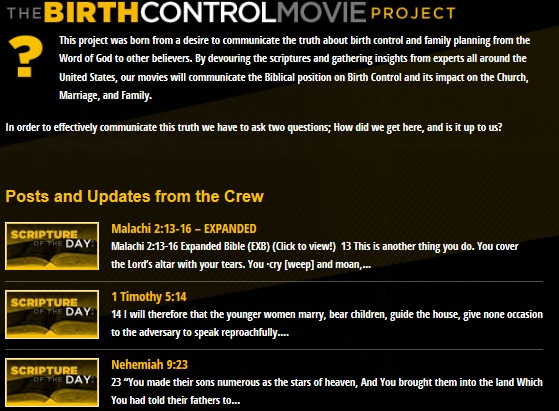http://youtu.be/ptTwi6-ii-s
It is freaking creepy that in 2013, use of birth control could be controversial. But if Monty Python thought this kind of insanity was limited to Catholic church hierarchy, they were sadly mistaken.
Some Christian commentators claim birth control is only a Catholic issue, but a North Carolina-based protestant Christian film producer disagrees.
Kevin Peeples, director of The Birth Control Movie Project, tells OneNewsNow that as a young married couple practicing birth control, he and his wife were convicted to stop using pregnancy-altering medicines like “the pill” after they attended the Baby Conference in 2010. He hopes Birth Control: How Did We Get Here? and its follow-up film will help others come to that same conviction.
“We hope that viewers will approach the Bible and say what does Scripture have to say on this issue? and not to approach and say what do I want the Scriptures to say,” Peeples shares. “The Lord wants us to let him control what he created in the first place.”
A look at the movie’s website is good for entertainment. They have Biblical verses that purport to explain why God would be against all sorts of birth control: creation of “life” is up to the Almighty, not to us.
And of course they are not finished.
The primary theme of Birth Control: Is It Up To Us?, the sequel film to be released in 2013, explains how Christians cannot be pro-life and pro-contraception.
“Look at how many times a couple has intercourse to how many children they have — it’s really less than one percent,” the director notes. “So a lot of people attack us and push us with you’re asking for us to have so many kids that we can’t provide for and all of these things, but it’s not like every single time you have intercourse you get pregnant and you have a baby.”
Got it? Since sex does not always equal pregnancy, you should not use birth control!
At other times, I would dismiss this movie as a bit of fringe propaganda. But the movement afoot challenging the Administration’s contraception mandate on grounds of “religious freedom”, coming not just from religious organizations but private businesses whose owners just happen to be religious, makes this really worrisome. But that could set a precedent, and then we would end up with all kinds of employers, not just Catholics, denying their employees basic health coverage. On the basis of this movie, anyone follower of any branch of Judaism or Christianity could claim that birth control coverage “violates their conscience”. Don’t forget, opposition to abortion also started as a Catholic issue and was later on taken up by protestants.
Given all the obsession with denying women coverage for birth control because it bothers her employer, you have to wonder how come all of these people are so vehemently anti-abortion, or to use their wording, “pro-life”. After all, if that were their real concern, wouldn’t they be pushing for more women having access to birth control, not fewer?
Providing birth control to women at no cost substantially reduced unplanned pregnancies and cut abortion rates by 62 percent to 78 percent over the national rate, a new study shows.
The research, by investigators at Washington University School of Medicine in St. Louis, appears online Oct. 4 in Obstetrics & Gynecology.
But the issue is not “protecting the unborn”. The issue is CONTROL, to deny women the ability to have their way with their own reproductive issues. Opposing abortion and birth control makes sense only in that light.

